- Home
- Louisa May Alcott
The Annotated Little Women Page 28
The Annotated Little Women Read online
Page 28
“The idea of being afraid of you! Well, you see we used to play ‘Pilgrim’s Progress,’ and we have been going on with it in earnest, all winter and summer.”
“Yes, I know,” said Laurie, nodding wisely.
“Who told you?” demanded Jo.
“Spirits.”
“No, it was me; I wanted to amuse him one night when you were all away, and he was rather dismal. He did like it, so don’t scold, Jo,” said Beth, meekly.
“You can’t keep a secret. Never mind; it saves trouble now.”
“Go on, please,” said Laurie, as Jo became absorbed in her work, looking a trifle displeased.
“Oh, didn’t she tell you about this new plan of ours? Well, we have tried not to waste our holiday, but each has had a task, and worked at it with a will. The vacation is nearly over, the stints are all done, and we are ever so glad that we didn’t dawdle.”
“Yes, I should think so;” and Laurie thought regretfully of his own idle days.
“Mother likes to have us out of doors as much as possible; so we bring our work here, and have nice times. For the fun of it we bring our things in these bags, wear the old hats, use poles to climb the hill, and play pilgrims, as we used to do years ago. We call this hill the ‘Delectable Mountain,’3 for we can look far away and see the country where we hope to live some time.”
Jo pointed, and Laurie sat up to examine; for through an opening in the wood one could look across the wide, blue river,—the meadows on the other side,—far over the outskirts of the great city,4 to the green hills that rose to meet the sky. The sun was low, and the heavens glowed with the splendor of an autumn sunset. Gold and purple clouds lay on the hill-tops; and rising high into the ruddy light were silvery white peaks, that shone like the airy spires of some Celestial City.
“How beautiful that is!” said Laurie, softly, for he was quick to see and feel beauty of any kind.
“It’s often so; and we like to watch it, for it is never the same, but always splendid,” replied Amy, wishing she could paint it.
“Jo talks about the country where we hope to live some time; the real country, she means, with pigs and chickens, and haymaking. It would be nice, but I wish the beautiful country up there was real, and we could ever go to it,” said Beth, musingly.
“There is a lovelier country even than that, where we shall go, by and by, when we are good enough,” answered Meg, with her sweet voice.
“It seems so long to wait, so hard to do; I want to fly away at once, as those swallows fly, and go in at that splendid gate.”
“You’ll get there, Beth, sooner or later; no fear of that,” said Jo; “I’m the one that will have to fight and work, and climb and wait, and maybe never get in after all.”
“You’ll have me for company, if that’s any comfort. I shall have to do a deal of travelling before I come in sight of your Celestial City. If I arrive late, you’ll say a good word for me, won’t you, Beth?”5
Something in the boy’s face troubled his little friend; but she said cheerfully, with her quiet eyes on the changing clouds, “If people really want to go, and really try all their lives, I think they will get in; for I don’t believe there are any locks on that door, or any guards at the gate. I always imagine it is as it is in the picture, where the shining ones6 stretch out their hands to welcome poor Christian as he comes up from the river.”
“Wouldn’t it be fun if all the castles in the air which we make could come true, and we could live in them?” said Jo, after a little pause.
“I’ve made such quantities it would be hard to choose which I’d have,” said Laurie, lying flat, and throwing cones at the squirrel who had betrayed him.
“You’d have to take your favorite one. What is it?” asked Meg.
“If I tell mine, will you tell yours?”
“Yes, if the girls will too.”
“We will. Now, Laurie!”
“After I’d seen as much of the world as I want to, I’d like to settle in Germany, and have just as much music as I choose. I’m to be a famous musician myself, and all creation is to rush to hear me; and I’m never to be bothered about money or business, but just enjoy myself, and live for what I like. That’s my favorite castle. What’s yours, Meg?”
Margaret seemed to find it a little hard to tell hers, and moved a brake before her face, as if to disperse imaginary gnats, while she said, slowly, “I should like a lovely house, full of all sorts of luxurious things; nice food, pretty clothes, handsome furniture, pleasant people, and heaps of money. I am to be mistress of it, and manage it as I like, with plenty of servants, so I never need work a bit. How I should enjoy it! for I wouldn’t be idle, but do good, and make every one love me dearly.”
“Wouldn’t you have a master for your castle in the air?” asked Laurie, slyly.
“I said ‘pleasant people,’ you know;” and Meg carefully tied up her shoe as she spoke, so that no one saw her face.
“Why don’t you say you’d have a splendid, wise, good husband, and some angelic little children? you know your castle wouldn’t be perfect without,” said blunt Jo, who had no tender fancies yet, and rather scorned romance, except in books.
“You’d have nothing but horses, inkstands, and novels in yours,” answered Meg, petulantly.
May Alcott decorated a panel at Orchard House with this painting. (Louisa May Alcott Memorial Association; photograph by James E. Coutré)
“Wouldn’t I, though! I’d have a stable full of Arabian steeds, rooms piled with books, and I’d write out of a magic inkstand, so that my works should be as famous as Laurie’s music. I want to do something splendid before I go into my castle,—something heroic, or wonderful,—that won’t be forgotten after I’m dead. I don’t know what, but I’m on the watch for it, and mean to astonish you all, some day. I think I shall write books, and get rich and famous; that would suit me, so that is my favorite dream.”7
“Mine is to stay at home safe with father and mother, and help take care of the family,” said Beth, contentedly.
“Don’t you wish for anything else?” asked Laurie.
“Since I had my little piano I am perfectly satisfied. I only wish we may all keep well, and be together; nothing else.”
“I have lots of wishes; but the pet one is to be an artist, and go to Rome, and do fine pictures, and be the best artist in the whole world,” was Amy’s modest desire.
“We’re an ambitious set, aren’t we? Every one of us, but Beth, wants to be rich and famous, and gorgeous in every respect. I do wonder if any of us will ever get our wishes,” said Laurie, chewing grass, like a meditative calf.
“I’ve got the key to my castle in the air; but whether I can unlock the door, remains to be seen,” observed Jo, mysteriously.
“I’ve got the key to mine, but I’m not allowed to try it. Hang college!” muttered Laurie, with an impatient sigh.
“Here’s mine!” and Amy waved her pencil.
“I haven’t got any,” said Meg, forlornly.
“Yes you have,” said Laurie, at once.
“Where?”
“In your face.”
“Nonsense; that’s of no use.”
“Wait and see if it doesn’t bring you something worth having,” replied the boy, laughing at the thought of a charming little secret which he fancied he knew.
Meg colored behind the brake, but asked no questions, and looked across the river with the same expectant expression which Mr. Brooke had worn when he told the story of the knight.
“If we are all alive ten years hence, let’s meet, and see how many of us have got our wishes, or how much nearer we are them than now,” said Jo, always ready with a plan.8
“Bless me! how old I shall be,—twenty-seven!” exclaimed Meg, who felt grown up already, having just reached seventeen.
“You and I shall be twenty-six, Teddy; Beth twenty-four, and Amy twenty-two; what a venerable party!” said Jo.
“I hope I shall have done something to be proud of by that time; bu
t I’m such a lazy dog, I’m afraid I shall ‘dawdle,’ Jo.”
“You need a motive, mother says; and when you get it, she is sure you’ll work splendidly.”
“Is she? By Jupiter I will, if I only get the chance!” cried Laurie, sitting up with sudden energy. “I ought to be satisfied to please grandfather, and I do try, but it’s working against the grain, you see, and comes hard. He wants me to be an India merchant, as he was, and I’d rather be shot; I hate tea, and silk, and spices, and every sort of rubbish his old ships bring, and I don’t care how soon they go to the bottom when I own them. Going to college ought to satisfy him, for if I give him four years he ought to let me off from the business; but he’s set, and I’ve got to do just as he did, unless I break away and please myself, as my father did. If there was any one left to stay with the old gentleman, I’d do it to-morrow.”
Laurie spoke excitedly, and looked ready to carry his threat into execution on the slightest provocation; for he was growing up very fast, and, in spite of his indolent ways, had a young man’s hatred of subjection,—a young man’s restless longing to try the world for himself.
“I advise you to sail away in one of your ships, and never come home again till you have tried your own way,” said Jo, whose imagination was fired by the thought of such a daring exploit, and whose sympathy was excited by what she called “Teddy’s wrongs.”
“That’s not right, Jo; you mustn’t talk in that way, and Laurie mustn’t take your bad advice. You should do just what your grandfather wishes, my dear boy,” said Meg, in her most maternal tone. “Do your best at college, and, when he sees that you try to please him, I’m sure he won’t be hard or unjust to you. As you say, there is no one else to stay with and love him, and you’d never forgive yourself if you left him without his permission. Don’t be dismal, or fret, but do your duty; and you’ll get your reward, as good Mr. Brooke has, by being respected and loved.”
“What do you know about him?” asked Laurie, grateful for the good advice, but objecting to the lecture, and glad to turn the conversation from himself, after his unusual outbreak.
“Only what your grandpa told mother about him; how he took good care of his own mother till she died, and wouldn’t go abroad as tutor to some nice person, because he wouldn’t leave her; and how he provides now for an old woman who nursed his mother; and never tells any one, but is just as generous, and patient, and good as he can be.”
“So he is, dear old fellow!” said Laurie, heartily, as Meg paused, looking flushed and earnest, with her story. “It’s like grandpa to find out all about him, without letting him know, and to tell all his goodness to others, so that they might like him. Brooke couldn’t understand why your mother was so kind to him, asking him over with me, and treating him in her beautiful, friendly way. He thought she was just perfect, and talked about it for days and days, and went on about you all, in flaming style. If ever I do get my wish, you see what I’ll do for Brooke.”
“Begin to do something now, by not plaguing his life out,” said Meg, sharply.
“How do you know I do, miss?”
“I can always tell by his face, when he goes away. If you have been good, he looks satisfied, and walks briskly; if you have plagued him, he’s sober, and walks slowly, as if he wanted to go back and do his work better.”
“Well, I like that! So you keep an account of my good and bad marks in Brooke’s face, do you? I see him bow and smile as he passes your window, but I didn’t know you’d got up a telegraph.”
“We haven’t; don’t be angry, and oh, don’t tell him I said anything! It was only to show that I cared how you get on, and what is said here is said in confidence, you know,” cried Meg, much alarmed at the thought of what might follow from her careless speech.
“I don’t tell tales,” replied Laurie, with his “high and mighty” air, as Jo called a certain expression which he occasionally wore. “Only if Brooke is going to be a thermometer, I must mind and have fair weather for him to report.”
“Please don’t be offended; I didn’t mean to preach or tell tales, or be silly; I only thought Jo was encouraging you in a feeling which you’d be sorry for, by and by. You are so kind to us, we feel as if you were our brother, and say just what we think; forgive me, I meant it kindly!” and Meg offered her hand with a gesture both affectionate and timid.
Ashamed of his momentary pique, Laurie squeezed the kind little hand, and said, frankly, “I’m the one to be forgiven; I’m cross, and have been out of sorts all day. I like to have you tell me my faults, and be sisterly; so don’t mind if I am grumpy sometimes; I thank you all the same.”
Bent on showing that he was not offended, he made himself as agreeable as possible; wound cotton for Meg, recited poetry to please Jo, shook down cones for Beth, and helped Amy with her ferns, proving himself a fit person to belong to the “Busy Bee Society.” In the midst of an animated discussion on the domestic habits of turtles (one of which amiable creatures having strolled up from the river), the faint sound of a bell warned them that Hannah had put the tea “to draw,” and they would just have time to get home to supper.
This exquisite still life is another example of May’s mature artistic talent. (Louisa May Alcott Memorial Association; photograph by James E. Coutré)
“May I come again?” asked Laurie.
“Yes, if you are good, and love your book, as the boys in the primer are told to do,” said Meg, smiling.
“I’ll try.”
“Then you may come, and I’ll teach you to knit as the Scotchmen do; there’s a demand for socks just now,”9 added Jo, waving hers, like a big blue worsted banner, as they parted at the gate.
That night, when Beth played to Mr. Laurence in the twilight, Laurie, standing in the shadow of the curtain, listened to the little David, whose simple music always quieted his moody spirit,10 and watched the old man, who sat with his gray head on his hand, thinking tender thoughts of the dead child he had loved so much. Remembering the conversation of the afternoon, the boy said to himself, with the resolve to make the sacrifice cheerfully, “I’ll let my castle go, and stay with the dear old gentleman while he needs me, for I am all he has.”
1. hill that lay between the house and river. There is a hill behind Orchard House and Hillside, but the river is not, as suggested later, visible from the hill’s summit, nor is the city of Boston, which lies in a different direction. This is another instance in which Alcott’s fictional geography differs from that of the actual Concord, Massachusetts.
2. “Bring on your bears.” This was a common slang phrase, meaning that the speaker was prepared for any challenge. One source suggests that the phrase originated with a boy who had read the biblical story in which a group of children taunt the prophet Elijah, are cursed by him, and are promptly torn to pieces by a pair of she-bears (2 Kings 2: 23–24). The boy, it is said, shouted, “Go up, thou bald head,” at an elderly man and then, “dodging as quickly as he could within the door . . . called out, ‘Now bring on your bears!’ ” (The Plough, the Loom, and the Anvil, p. 762).
3. “ ‘Delectable Mountain.’ ” In The Pilgrim’s Progress, the Delectable Mountains are “Immanuel’s Land,” within sight of Christian’s destination, the Celestial City.
4. the great city. Presumably, Boston. When Bronson Alcott first saw Boston in 1828, it did, indeed, strike him as celestial. He called it “a city in our world upon which the light of the sun of righteousness has risen. . . . Its influences are quickening and envigorating the souls that dwell within it. . . . It is the city that is set on high” (A. Bronson Alcott, Journals, p. 15). After his Temple School collapsed, Bronson revised his opinion sharply downward, calling the city “feculent” and infested with “seventy plagues” (Dahlstrand, Amos Bronson Alcott, p. 146). Louisa spent her poorest years in Boston, where she found at seventeen that “the bustle and dirt and change send all lovely images and restful feelings away” (Louisa May Alcott, Journals, p. 61). As an adult, though, she lived there intermittently, enjoying t
he city’s cultural offerings and some temporary freedom from family obligations.
5. “say a good word for me, won’t you, Beth?” Hints that Beth will lead the way toward heaven begin early.
6. “the shining ones.” Beth alludes to the angels in The Pilgrim’s Progress who minister to Christian at the end of his journey and proclaim him an Heir of Salvation.
Christian is aided by the Shining Ones in this illustration from one of Bronson’s personal copies of The Pilgrim’s Progress. (Houghton Library, Harvard University)
7. “so that is my favorite dream.” At seventeen Alcott herself imagined a much more modest castle in the air. She told her journal, “[My mother] is a very brave, good woman, and my dream is to have a lovely, quiet home for her, with no debts or troubles to burden her” (Louisa May Alcott, Journals, p. 63).
8. always ready with a plan. Jo’s “plan” supplies the pivotal question for the remainder of the novel: Will any of the March sisters realize her dreams? It is arguably at this moment that Little Women ceases to be a series of episodes and acquires the organization of a full-fledged novel.
9. “I’ll teach you to knit as the Scotchmen do; there’s a demand for socks just now.” Presumably, Jo is still making garments for Union army soldiers. Scotland had enjoyed a reputation for fine knitting for at least two centuries.
10. quieted his moody spirit. In the Bible the future King David is “a cunning player on an harp,” whose tunes struck on a lyre cause an evil spirit to depart from Saul (1 Samuel 16:16).
CHAPTER XIV.
Secrets.
JO was very busy up in the garret, for the October days began to grow chilly, and the afternoons were short. For two or three hours the sun lay warmly in at the high window, showing Jo seated on the old sofa writing busily, with her papers spread out upon a trunk before her, while Scrabble,1 the pet rat, promenaded the beams overhead, accompanied by his oldest son, a fine young fellow, who was evidently very proud of his whiskers. Quite absorbed in her work, Jo scribbled away till the last page was filled, when she signed her name with a flourish, and threw down her pen, exclaiming,—

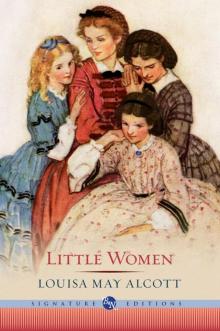 Little Women
Little Women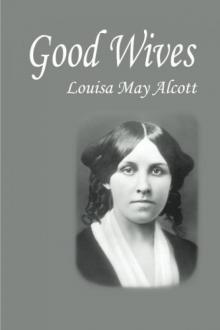 Good Wives
Good Wives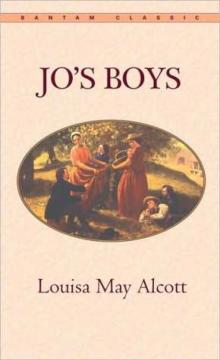 Jo's Boys
Jo's Boys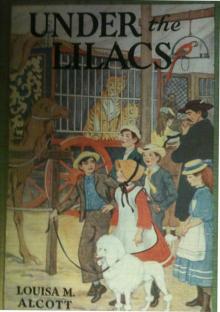 Under the Lilacs
Under the Lilacs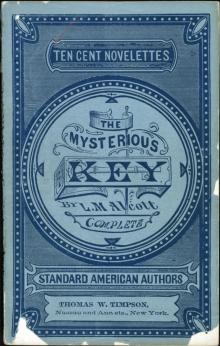 The Mysterious Key and What It Opened
The Mysterious Key and What It Opened The Inheritance
The Inheritance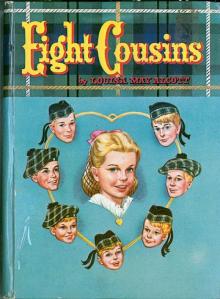 Eight Cousins
Eight Cousins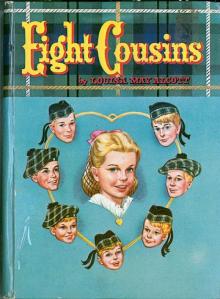 Eight Cousins; Or, The Aunt-Hill
Eight Cousins; Or, The Aunt-Hill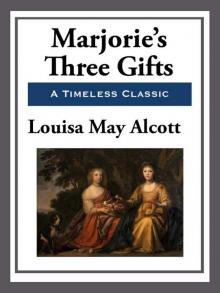 Marjorie's Three Gifts
Marjorie's Three Gifts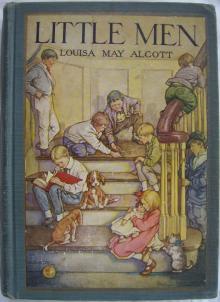 Little Men
Little Men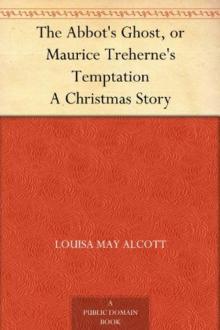 The Abbot's Ghost, or Maurice Treherne's Temptation: A Christmas Story
The Abbot's Ghost, or Maurice Treherne's Temptation: A Christmas Story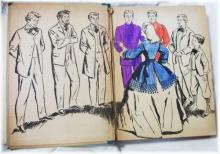 Rose in Bloom
Rose in Bloom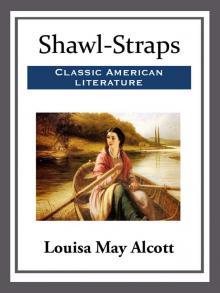 Shawl-Straps
Shawl-Straps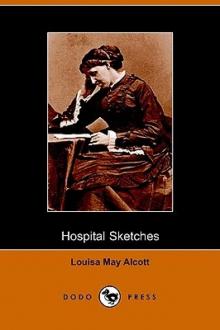 Hospital Sketches
Hospital Sketches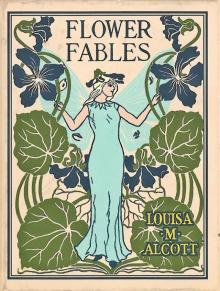 Flower Fables
Flower Fables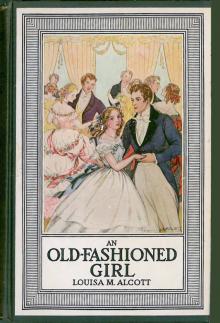 An Old-Fashioned Girl
An Old-Fashioned Girl The Candy Country
The Candy Country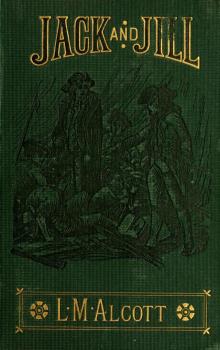 Jack and Jill
Jack and Jill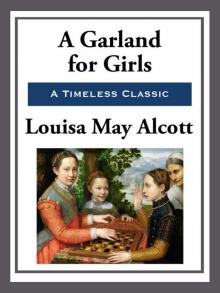 A Garland for Girls
A Garland for Girls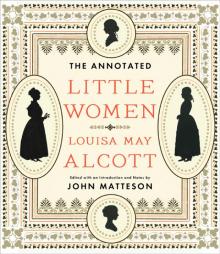 The Annotated Little Women
The Annotated Little Women A Classic Christmas
A Classic Christmas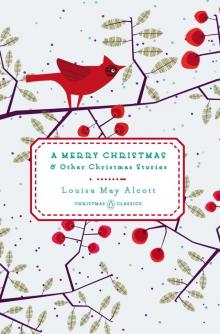 A Merry Christmas
A Merry Christmas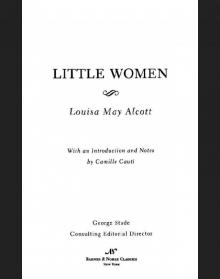 Little Women (Barnes & Noble Classics Series)
Little Women (Barnes & Noble Classics Series)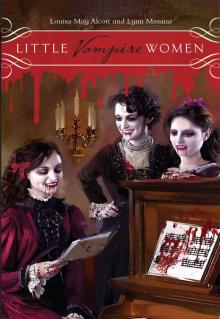 Little Vampire Women
Little Vampire Women